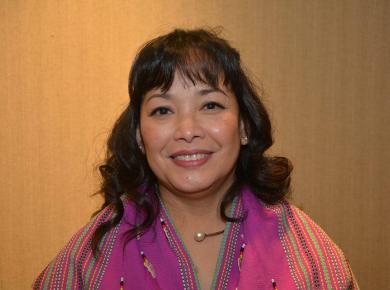Posted: February 1, 2016
Joji Pantoja
At one of the breakout sessions in MWC Assembly Gathered 2015 in Harrisburg, Pennsylvania, last July, former and present MWC workers exchanged coffee from their respective countries during their reunion. Unbeknownst to many, one special brand traded that day is not just another coffee.
Coffee for Peace from the Philippines is JUST coffee.
The story of this peace and justice coffee is deeply rooted in the midst of conflict and unrest in the heart of Mindanao.
The COFFEE FOR PEACE Story
Dann and Joji Pantoja migrated to Canada to raise their family during the 1980s when the Philippines was at the peak of its turmoil against a dictatorial regime. In 2006, they felt led by the Lord to serve in their home country again; but this time, in a province at the southern part of the Philippines where neither of their families is from. They chose to establish their peacebuilding mission in Davao City. While Davao City is beautiful and generally peaceful, it is surrounded by the conflict-ridden Mindanao uplands.
The couple lost no time working out their passion for peacebuilding. Soon, Dann established Peacebuilders Community, Inc., while his wife Joji founded Coffee for Peace, Inc., an inclusive business community committed to protect and enhance the environment, journey with farmers toward improvements, and support peacebuilders working on the ground.
Coffee for Peace has a simple and yet elegant coffee shop in Davao City. A visitor to this coffee shop can see the advocacy for promoting coffee produced by the locals. But upon a closer examination, one will realize that this is not just promotion of the local coffee, but that it advocates peace and justice through fair trade. In fact, this coffee shop is a visual representation of the hard work and tough journey behind Joji’s accolades, recognized even by the United Nations Development Programme.
When the couple first visited the upper regions in Mindanao, they engaged in dialogue among groups whose problems and conflict were mainly rooted in land ownership. The fights, unrest, and conflicts were all due to injustices when migrants with land titles would flock to the ancestral lands of the indigenous residents who have no title to show legal proof of ownership. Furthermore, these poor coffee farmers get almost nothing from their high-quality coffee beans because large corporations can bargain for their product at a very cheap price.
In these dialogues and peace talks, the couple observed that coffee was the main beverage being served. When the people drink coffee together, they seem to be more calm and agreeable. Thus, the inspiration of working with the local coffee farmers to encourage collaboration among conflicting groups to instigate peacebuilding began.
Joji trained coffee farmers, teaching them their importance in the cycle of coffee production and the real monetary value of their product. From planting and production to trading, Joji was relentless in establishing this peacebuilding advocacy among the coffee farmers in Mindanao. Using her own networks and resources, she was able to tap into international markets who were willing to trade fairly for the farmers’ coffee.
To date, Coffee for Peace is trading with international markets in Canada, USA, and soon also in Australia and New Zealand. The peace advocacy of Coffee for Peace is also expanding not only in the southern part of the Philippines but also to the Cordillera region in the north where similar stories of conflict exist.
Coffee for Peace was one of six winners of the United Nations Development Programme’s IIX N-Peace Innovation Challenge for a “sustainable, scalable, inclusive peacebuilding that has long-term and transformative impact.” The award was presented on 23 October 23, 2015 in New York City to Joji Pantoja, the founder and CEO of Coffee for Peace. Almost as if it were a prelude to this award, in July 2015, Joji was appointed as chair of the Peace Commission of Mennonite World Conference.
Truly, justice and peace work together and they are attainable even through a small means – like JUST coffee.
Remilyn Mondez (Philippines) is an assistant professor at Malayan Colleges Laguna and is currently taking her doctoral degree in communication. She was one of the YAB speakers at PA 2015 and a delegate at GYS 2009.
UPDATE 2020
MWC Peace Commission chair Joji Pantoja is a 2020 recipient of the Oslo Business for Peace Award. Honourees are selected by an independent committee of Nobel Prize Laureates in Peace and in Economics after a global nomination process. The award recognizes global business leaders who “ethically create economic value that also creates value for society.”
Learn more: https://businessforpeace.no/award/2020-honourees/





Join the Conversation on Social Media
FacebookTwitterInstagramFlickrYouTube